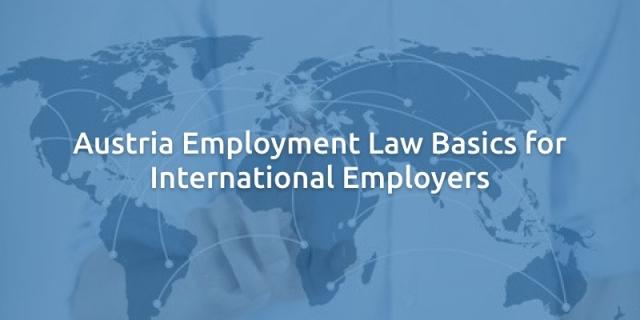Given its thriving economy and major trading partners, such as Germany, Austria employment is a fantastic way to build your company’s international operations. One of the many benefits offered to Austrian employers includes a “social partnership,” in which unions, employer representatives, and legislators cooperate on a local level. This arrangement develops regulations to prevent potential conflicts of interest and resolve issues across many industries.
With changing regulations and complicated labor laws in any overseas market, it’s always smart to collaborate with an in-country expert. Global expansion solutions including International PEO (Professional Employer Organization) and Foreign Subsidiary as a Service (FSaaS) exist to help employers navigate compliance and focus on finding the best talent for their team.
These Employer of Eecord (EOR) solutions allow international businesses to establish a legal presence in their target country (i.e. Austria) and receive personalized assistance with hiring, payroll, and termination. It’s also faster and less expensive than establishing a foreign subsidiary from scratch.
Austria Employment Options
Employers have three options for Austria employment, which include:
- Employee
- Freelancer
- Contractor
Employees are full-time team members that work within the confines of your business. As the employer, you set the schedule, which must fall within the weekly working hour requirements, along with the place of operations and the instructions for the job. In Austria, employees are divided into two categories:
- White Collar Employees
- Blue Collar Employees
White collar employees perform commercial business work, or office work, while blue-collar workers perform manual or skilled labor. Both types of employees are subject to entitlements, which we will discuss shortly.
As for freelancers and contractors, these workers must act autonomously and are not protected by Austria employment law. Learn more about hiring independent contractors overseas and the risks employers face in this post.
Austria Employment: Entitlements
Labor law regulations protect employees in Austria. Also, white-collar employees (remember - there are two types of employees) receive additional privileges with regards to termination dates, which are outlined in the Austrian White Collar Employee Act (Angestelltengesetz).
The mandatory requirements for employees in Austria include:
- Holiday Allowance
- Sick Pay
- Maternity Leave
- Employee Representation & Works Council Rights
- Gender Equality
- Protection Against Dismissal
- Social Security Contributions
Employing overseas is much different than employing in the US. For example, employees receive a minimum of 25 paid holiday days each year.
To ensure you’re managing compliance in your new country, we highly suggest using one of the EOR services, like International PEO, that we mentioned above.
Employment Agreements
When employing in Austria, you need to kick off the arrangement with written employment agreements. In fact, employers are required to give a written record (Dienstzettel) of the essential rights and obligations under the employment contract to the employee upon employment.
Terminating Employees in Austria
One of the most difficult aspects of hiring internationally is navigating termination requirements. In Austria, an employee's status determines termination requirements. Without an agreement stating otherwise, all white collar employees must receive one month’s notice before termination. On the other hand, blue-collar employees must give 14 days’ notice.
White-collar employees in Austria also have termination requirements based on length of service, which are as follows:
- Less than or equal to two years' service requires six weeks' notice.
- More than two years' service requires two months' notice.
- More than five years' service requires three months' notice.
Income Tax
As an employer, you’re also responsible for managing income tax withholding for your team members. Under Austrian tax law, an individual is generally taxable in Austria if they reside and work in Austria. We suggest working with a tax expert or international payroll provider to manage tax withholdings for your overseas employees.
IP Protection
It's important to know that intellectual property (IP) isn't protected in overseas markets, such as Austria. According to Austria employment law, if the employee creates IP on the job, they own the rights. As a result, your company should always include language in the employment contract to protect your IP and establish who owns the material.
We’re here to help. Our team helps companies navigate employment law in countries all over the world, including Austria. Contact us today to ask questions and kickstart your global expansion plan!
Topic:
Country Guides



